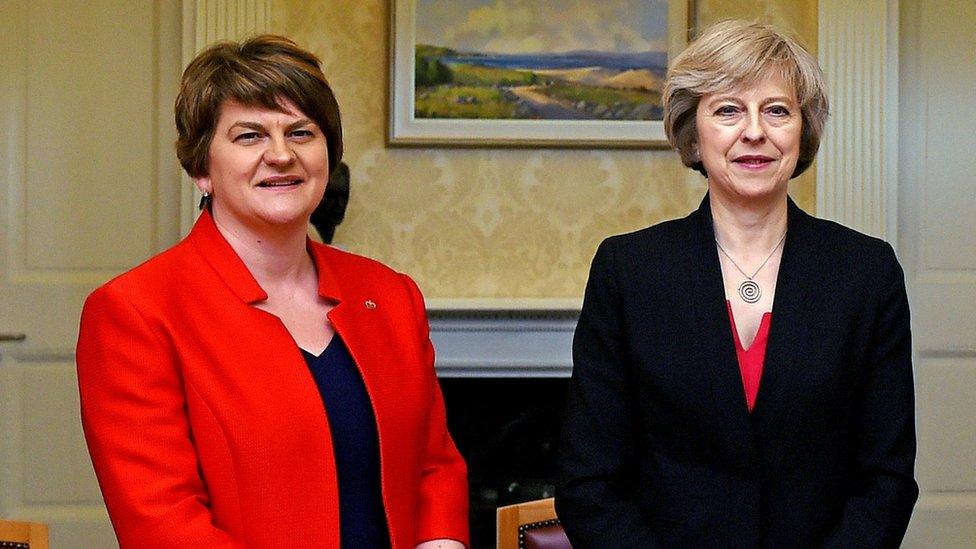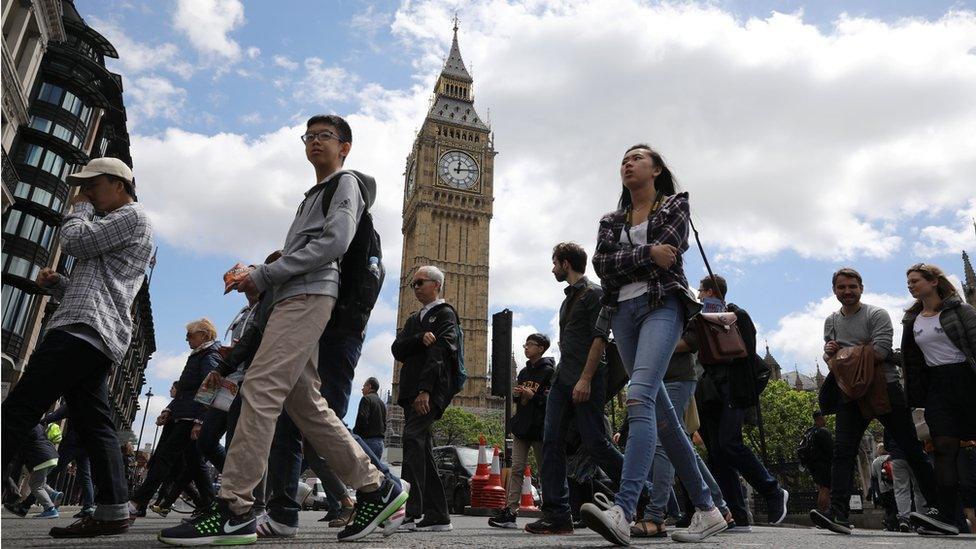Can a Conservative and DUP pact work?
- Published

Arlene Foster, leader of the Democratic Unionist Party, with Prime Minister Theresa May
Can a Conservative and DUP pact possibly govern for the life of this Parliament? They face a long, precarious high wire act if they attempt to do so, and they - and any alternative alliance - will be beset by troubles and entanglements at every turn.
Armed with a combined majority of three MPs, their pact would also be bolstered by the absence of the seven Sinn Fein MPs who continue to refuse to take their seats, and probably by the support of the independent unionist, Lady Sylvia Hermon.
But those numbers assume all MPs toe the party line in every vote. And that looks unlikely.
Imagine you are Tory MPs Zac Goldsmith - with a majority of 45 votes - or Theresa Villiers - who has a majority of 353 - or one of the legion of other Conservatives who have just scraped in - often having seen apparently comfortable majorities dissolve.
Suppose you are asked to support a measure which could have constituency consequences, like a squeeze on school funding, or a hospital downgrade. It's easy for the opposition parties, they can oppose.
However, you face a choice between braving the wrath of the government whips, or providing your local opponents with a new stick with which to beat you.
Nobody knows what those particular individuals would do, when confronted by such a choice, but it is a fair bet that some Conservative MPs might be prepared to defy the whip - and it would only take a handful, fewer even than in the last Parliament.
The same problem applies to infrastructure mega-projects - can a government with such a small majority deliver the next phases of HS2 or Heathrow expansion?
DUP want 'pork'
Then we come to Brexit. This election was supposed to be about strengthening the prime minister against inimical anti-Brexit forces in Parliament. Yet she emerges far weaker.
I question whether the new government can cobble together a majority for any version of Brexit - hard, soft, poached, scrambled, or devilled with Tabasco sauce - without losing the support of some Conservative MPs, and potentially losing a Commons vote.
The DUP factor matters here.
Remember the DUP are a Northern Ireland party, with deep concerns about maintaining a "frictionless" border with the Republic of Ireland, which could complicate the ultimate deal, possibly dragging the government into a deal which could arouse the ire of Conservative Brexiteers, if it did not ditch the European Court of Justice, or if it involved unacceptable payments to the EU in return for market access.
The other aggravating factor about the DUP is its coldly transactional approach.
Of course they have a policy agenda - but they also want what the Americans call "pork". Extra funding for all things Northern Ireland, more powers for the NI Executive - if it can be reconstituted - localised tax concessions, you name it. And some of these things would have to come at the expense of English constituencies.
It is worth remembering that the last time a UK government was sustained by Northern Irish votes, it didn't end well.
James Callaghan's minority Labour government of the mid 1970s survived, hand to mouth, for years until Callaghan could no longer stomach the endless deal-making. He might have survived the famous 1979 Commons no confidence debate, if he'd been prepared to fund a gas pipeline to Northern Ireland, but he'd had enough.

People walking past Big Ben
Half way through the election campaign I was hearing that the government's chief whip, Gavin Williamson, had embarked on a tour to meet and mark the cards of the candidates who were expected to win in the predicted Tory landslide.
Most will not be arriving, and if he stays in post, his job will be the kind of extreme whipping last seen when Callaghan's legendary parliamentary ringmaster, Walter Harrison (the hero of James Graham's great play This House) ducked, dived, manoeuvred, cajoled and arm-twisted to keep the minority Labour government in power.
On one level it was one of the most brilliant whipping performances in Parliamentary history; on another the spectacle of endless wheeler-dealing may have worsened Labour's ultimate electoral crash, when the government finally fell.
Clock ticking
Now, Mr Williamson, or his successor, will have to hold the Tory factions together, possibly through a divisive leadership battle.
He will have to soothe ideological and Brexit divisions, and smooth the ruffled feathers of ministers who were said to be facing removal from the cabinet - as well as ex-ministers dropped when the prime minister took over.
An early test will be the appointments to her new government. Will unifying figures like the 1922 Committee Chairman Graham Brady be brought into the fold? Will dangerous luminaries of the David Cameron years - such as former chief whip Mark Harper - return to government. There are, at least, vacancies to fill.
If the government can dance with sufficient agility, it might be able to survive for a fair while. But there is a difference between survival and governing.
The Brexit clock is ticking, the economy needs attention, and the world is a dangerous place. Decisions are unavoidable, but getting them through the Commons may prove impossible.
And at some point another election may become unavoidable, too.